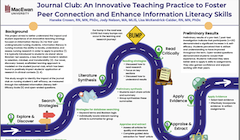Journal Club: An Innovative Teaching Practice to Foster Peer Connection and Enhance Information Literacy Skills
DOI:
https://doi.org/10.20343/teachlearninqu.11.30Keywords:
faculty-librarian collaboration, Information literacy, nursingAbstract
This project aimed to better understand the impact and student experience of an innovative teaching strategy focused on information literacy (IL) for first-year undergraduate nursing students. Information literacy (IL) involves the development of a set of abilities essential for higher education learners, such as the ability to identify, critically evaluate, understand, and apply scholarly literature (ACRL 2013), yet studies often demonstrate that these IL skills are lacking and need further development (Bury 2016; Saunders 2012). Traditional methods of addressing this need center around stand-alone librarian-led IL sessions, which cannot provide the time or space needed to develop critical reading and reflection practices. Within our context of nursing, this is a common challenge; one study found that 40% of second-year nursing students have difficulty reading journal articles (Chaudoir et al. 2016), despite IL being an essential skill for nursing practice (Mitchell and Pereira-Edwards 2022). In an attempt to address learner needs, a course instructor and librarian teamed up. Journal clubs, used in practice settings to maintain currency and promote EBP behavior (Wilson et al. 2015), have been used successfully in other health education contexts (Steenbeek et al. 2009; Szucs et al. 2017; Thompson 2006). This application is referred to as evidence-based practice (EBP) and is an essential component of nursing practice. Having activities for undergraduate nursing students that instill EBP aims to ensure that it will be incorporated into practice after graduation (Mitchell and Pereira-Edwards 2022). Instead of the traditional librarian-led IL sessions, a first-year nursing course was redesigned to utilize a guided journal club approach to enhance the ability to seek, read, and interpret journal literature. Journal club activities took place over eight weeks, alternating guided activities with brief IL lessons, and culminated in a group journal club assignment. Students were placed in small groups based on an area of practice they wanted to learn more about. Activities were scaffolded starting with introducing a research database and basic literature searching strategies. As students progressed through the term’s journal club activities, they were asked to find articles related aligned with course topics and their area of practice, critique and present their articles to their group members, and then apply their interpretations. A survey was used to measure the impact of journal club on student IL self-efficacy, as measured through the validated Information Literacy Self-Efficacy Scale (ILSES) developed by Kurbanoglu et al. (2006). Initial findings support journal club as an effective modality to enhance students’ self-efficacy in specific areas of IL. Additionally, other valuable outcomes of this strategy were discovered. For example, students reported becoming more comfortable collaborating with peers and anecdotal reports showed students developed friendships with peers. This scaffolded journal club approach to discipline-specific IL learning would translate well to other contexts, particularly those that require a significant grounding in reading and understanding disciplinary research. The journal club activities are available at: https://tinyurl.com/JournalClubPosterISSOTL2022, or by contacting the authors.
Click here to read the corresponding ISSOTL blog post.
References
Association of College and Research Libraries (ACRL). 2013. “Information Literacy Competency Standards for Nursing.” Guidelines, Standards, and Frameworks. http://www.ala.org/acrl/standards/nursing.
Bury, Sophie. 2016. “Learning from Faculty Voices on Information Literacy: Opportunities and Challenges for Undergraduate Information Literacy Education.” Reference Services Review 44 (3): 237–52. https://doi.org/10.1108/RSR-11-2015-0047. DOI: https://doi.org/10.1108/RSR-11-2015-0047
Chaudoir, Susan, Gerri Lasiuk, and Katherine Trepanier. 2016. “Writing Assignments: A Relatively Emotional Experience of Learning to Write in One Baccalaureate Nursing Program.” Quality Advancement in Nursing 2 (2): Article 3. https://dx.doi.org/10.17483/2368-6669.1061. DOI: https://doi.org/10.17483/2368-6669.1061
Ippoliti, Cinthya. 2018. “Re-imagining the One-shot: The Case for Transformational Teaching.” Scholarship of Teaching and Learning, Innovative Pedagogy 1 (1): Article 3. https://digitalcommons.humboldt.edu/sotl_ip/vol1/iss1/3.
Kim, Son Chae, Sydney Sabel, Sarah McHargue, and Rosaleen D. Bloom. 2020. “Impact of an Extracurricular, Student-led Journal Club on Evidence-based Practice among Baccalaureate Nursing Students.” International Journal of Nursing Education Scholarship 17 (1). https://doi.org/10.1515/ijnes-2020-0004. DOI: https://doi.org/10.1515/ijnes-2020-0004
Kurbanoğlu, Serap S., Buket Akkoyunlu, and Aysun Umay. 2006. “Developing the Information Literacy Self-efficacy Scale.” Journal of Documentation 62 (6): 730–43. https://dx.doi.org/10.1108/00220410610714949. DOI: https://doi.org/10.1108/00220410610714949
Laaksonen, Camilla, Hannele Paltta, Marjale von Schantz, Minna Ylönen, and Taina Soini. 2013. “Journal Club as a Method for Nurses and Nursing Students’ Collaborative Learning: A Descriptive Study.” Health Science Journal 7 (3): 285–92.
Mitchell, Kim M., and Marlo Pereira-Edwards. 2022. “Exploring Integrated Threshold Concept Knowledge as a Route to Understanding the Epistemic Nature of the Evidence-based Practice Mindset.” Journal of Professional Nursing 42: 34–45. https://dx.doi.org/10.1016/j.profnurs.2022.05.011. DOI: https://doi.org/10.1016/j.profnurs.2022.05.011
Saunders, Laura.2012. “Faculty Perspectives on Information Literacy as a Student Learning Outcome.” The Journal of Academic Librarianship 38 (4): 226–36.
https://doi.org/10.1016/j.acalib.2012.06.001. DOI: https://doi.org/10.1016/j.acalib.2012.06.001
Steenbeek, Audrey, Nancy Edgecombe, Joel Durling, AdeleLeBlanc, Rosemary Anderson, and Ruth Bainbridge. 2009. “Using an Interactive Journal Club to Enhance Nursing Research Knowledge Acquisition, Appraisal, and Application.” International Journal of Nursing Education Scholarship 6 (1): 1–8. https://doi.org/10.2202/1548-923X.1673. DOI: https://doi.org/10.2202/1548-923X.1673
Szucs, Kimberly A., Jeryl D. Benson, and Brianne Haneman. 2017. “Using a Guided Journal Club as a Teaching Strategy to Enhance Learning Skills for Evidence-Based Practice.” Occupational Therapy in Health Care 31 (2): 143–49. https://doi.org/10.1080/07380577.2016.1278296. DOI: https://doi.org/10.1080/07380577.2016.1278296
Thompson, Cathy J. 2006. “Fostering Skills for Evidence-Based Practice: The Student Journal Club.” Nurse Education in Practice 6 (2): 69–77. https://doi.org/10.1016/j.nepr.2005.08.004. DOI: https://doi.org/10.1016/j.nepr.2005.08.004
Wilson, Marian, Suzanna Ice, Cathy Y. Nakashima, Lynn Annette Cox, Elizabeth C. Morse, Ginu Philip, and Ellen Vuong. 2015. “Striving for Evidence-based Practice Innovations Through a Hybrid Model Journal Club: A Pilot Study.” Nurse Education Today 35 (5): 657–62. https://doi.org/10.1016/j.nedt.2015.01.026. DOI: https://doi.org/10.1016/j.nedt.2015.01.026

Downloads
Published
Issue
Section
License
Copyright (c) 2023 Hanneke Croxen, Jody Nelson, Lisa McKendrick-Calder

This work is licensed under a Creative Commons Attribution-NonCommercial 4.0 International License.






